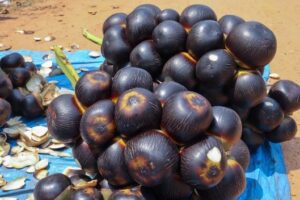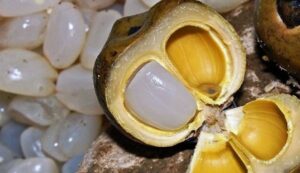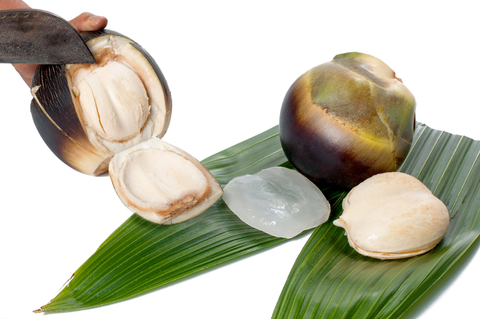 The fruit has a shape resembling that of a mangosteen, with flesh similar to kolang-kaling and a
The fruit has a shape resembling that of a mangosteen, with flesh similar to kolang-kaling and a
taste that brings back memories of coconut. Can you guess which fruit it is?
Currently going viral on social media with the numerous positive reviews and responses piqued
my curiosity about it.
 The name of the fruit is lontar. It grows in clusters on a tall palm tree native to South and Southeast Asia in the Indomalaya region. It features clear white flesh resembling kolang-kaling and serves as the symbolic flora of South Sulawesi Province.
The name of the fruit is lontar. It grows in clusters on a tall palm tree native to South and Southeast Asia in the Indomalaya region. It features clear white flesh resembling kolang-kaling and serves as the symbolic flora of South Sulawesi Province.
Lontar is recognized by various names across the archipelago. In Java, it is known as siwalan
while in Rote, it is referred to as Nusa Lontar. This plant can also be found in other parts of
East Nusa Tenggara such as Timor Island and Sabu Island.
The people of NTT utilize almost every part of these wild-growing trees. Belonging to the
Borassus flabellifer species, they serve as a source for food, shelter, and clothing.
The wood derived from the outer trunk of the palm tree is of excellent quality. It is heavy,
sturdy, and blackish in color. People commonly utilize this wood for construction purposes, as
well as for crafting tools and handicrafts. The stalk and fronds of the tree produce a fiber that
is beneficial for the body.
The female flowers of the lontar tree can be tapped and consumed directly as legen (nira), or
can be cooked into sugar. Alternatively, they can be fermented to produce tuak, a traditional
alcoholic beverage.
Lontar is known for its high water content and smooth texture. In addition to its delightful
taste, the fruit contains a wide range of nutrients beneficial for the body, including vitamin B,
vitamin C, iron, zinc, potassium, calcium, phosphorus, thiamin, and riboflavin. This palm fruit
trully offers a multitude of health benefits due to its nutrient content.
Some of the benefits of lontar:
1. Helping with digestive problems
Palm fruits serve as natural remedy for some stomach ailments and digestive problems. They
aid in relieving constipation and in promoting normal bowel movements.
The fruit also is also believed to prevent acidity and stomach ulcers. Furthermore, lontar is
recommended for pregnant women as it can help stomach ailments and nausea that often
occur during pregnancy.
2. Resolving skin problems
The anti-inflammatory properties of lontar are beneficial in treating skin redness caused by
heat. A paste made from lontar has been proven effective in treating dermatitis and can be
safely used on infants.
3. Preventing diabetes
Choosing lontar, which us low in glycemic index, as a substitute to artificial sugar can help
reduce the risk of developing diabetes.
Palm fruits are considered a healthy choice for consumption due to their rich mineral and
vitamin content. Their popularity on social media is not unfounded.
Among the products derived from the lontar plant, Rote Lontar Sugar is one of the
consumables. Both organoleptic analysis conducted by PT Saraswanti Indo Genetech in Bogor and the overall assessment by the Rote people confirm the following characteristics of Rote Lontar Sugar in the form of Liquid Sugar, Plate Sugar, and Ant Sugar are as follow:
– It has a natural aroma with a nice fragrant smell.
– The color ranges from yellow to brown.
– It possesses a sweet taste with a subtle hint of delightful sourness.
Rote Lontar Sugar has been officially registered at the Directorate of Trademarks and
Geographical Indications as sugar with distinctive features and excellent quality.
References:
https://www.cnnindonesia.com/gaya-hidup/20221116190650-262-874748/8-manfaat-buah-lontar-cegah-dehidrasi-hingga-penyakit jantung#:~:text=Buah%20lontar%20memiliki%20sifat%20anti,ekspektoran%20dan%20sebagai%20tonik%20hati.
https://www.halodoc.com/artikel/manfaat-buah-lontar-untuk-kesehatan-tubuh
https://hellosehat.com/nutrisi/fakta-gizi/manfaat-buah-lontar/
https://id.wikipedia.org/wiki/Lontarhttps://pdki-indonesia.dgip.go.id/detail/IG.00.2017.000014?type=gi









No comments yet.